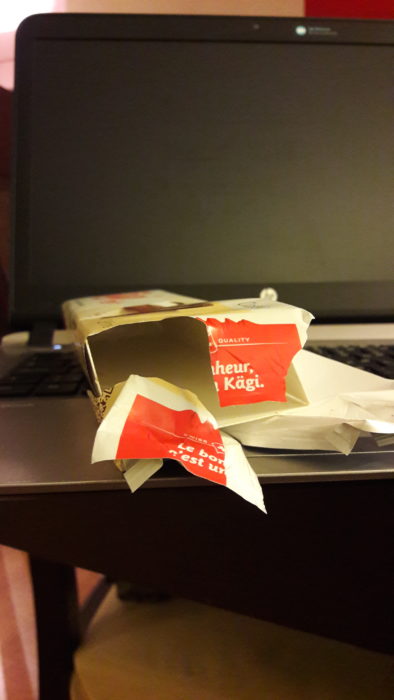20th March 2017 Geneva, Switzerland
What lies beneath

I’m in big trouble. For the second Sunday running I’ve single-handedly, polished off a 26-pack of chocolate wafer biscuits which were supposed to be carefully rationed for the kids over the weeks ahead. I know it’s not going to do me much good come the morning as I try and squeeze into my suit, but I’m going to plead the Council in mitigation. With so much going on, food consumption during the day is rarely an option for most of us and my one attempt at lunch this week proved to be particularly poorly timed. Just as I handed in my ticket at the pizza queue, security swooped in to cordon off and evacuate the area, while they checked and disposed of some carelessly unattended bag. It felt like the powers that be were sending me a sign that after all those wafers I should go for the salad rather than pizza. From sharing hunger stories with colleagues, it seems there are two main Council diets, both of which point to some evolutionary regression. Delegates either go crepuscular, eating in safety during the twilight hours, or else they go fully reptilian and consume close to their bodyweights at rare intervals during the session. Judging by the way my skin is scaling over, it seems I’m better suited to the latter.

The Council got through a lot of serious work in week three, hearing the latest reports on some of the world’s most pressing human rights crises including in North Korea, Iran, Eritrea, Burundi and South Sudan. The situation in Syria got a particularly strong focus, with another damning report by the Council’s Commission of Inquiry and a panel discussion with victims and witnesses of enforced disappearances and arbitrary detentions. The panel provided a powerful reminder about the tens of thousands of detainees in Syria who are held without access to any outside monitors, and routinely subjected to torture and other ill-treatment. High Commissioner Zeid described Syria as the worst man-made disaster since the Second World War and said that the entire country had become a torture chamber. The UK is leading a group 11 countries that has proposed renewing the Council’s Commission of Inquiry on Syria for a further year, and this will be an important test of the new Council composition.
A large number of the resolutions put forward this session seek to renew the Council’s Rapporteurs who provide vital monitoring and assistance on particular issues including on torture, human rights defenders, freedom of expression and minority issues. The Council will have heard from more than 20 of these experts in the course of the session but regrettably there is not enough time to take full advantage of the expertise which the Rapporteurs bring, or to have substantive discussions on their work. Last week, Yanghee Lee, as the Chair of the Committee which coordinates the Rapporteurs, presented a helpful report which showed that far too little is done to respond to the fact that many states, including Council members, still do not let the Rapporteurs into their countries.
On the Burma resolution, which I’ve been following closely, the EU has responded to a range of concerns, by replacing its suggestion for a new investigation by the Special Rapporteur with a fact-finding Mission appointed by the Council President. Burma has attended all of the public negotiations but without taking part, while several of its ASEAN partners have expressed misgivings over any form of independent international involvement. It would be to Burma’s great credit if it were to recognise the benefits of accepting outside help and cooperate with a Mission to look into recent allegations, especially those in Rakhine state.
As we enter the final week of the session it is not entirely clear what will happen on a good number of the forty or so resolutions which have been put forward. Most resolutions are likely to go through by consensus, but you can never quite tell which ones are going to be the most problematic until just before the voting starts in the final couple of days. The problem with the Council is that things are never quite what they appear, and there is often an unpleasant surprise lurking just out of sight, in the form of a vote, a late amendment or procedural trick designed to cause mayhem and delay. It makes the atmosphere rather paranoid and edgy, and provides a real test of everyone’s nerve.
I’ll be back at the end of the session to let you know how it’s all gone. If you see me around, I’ll happily accept cups of tea to help me concentrate but please don’t offer me food. I’m already fed for the week.

Dear Bob,
Great piece as always!
I must say that I found particularly disturbing that you are depriving your kids from their cookies precisely at this session, in which they were around 30 side events and one important resolution on the rights of the child!!
Have no fear Guillaume . My wife is a child rights specialist and she’s bought more packets which she’s keeping well hidden from me.
Interesting! I will gladly invite you to my tee party as there will be no food on the tables or at list guests will bring their own food!